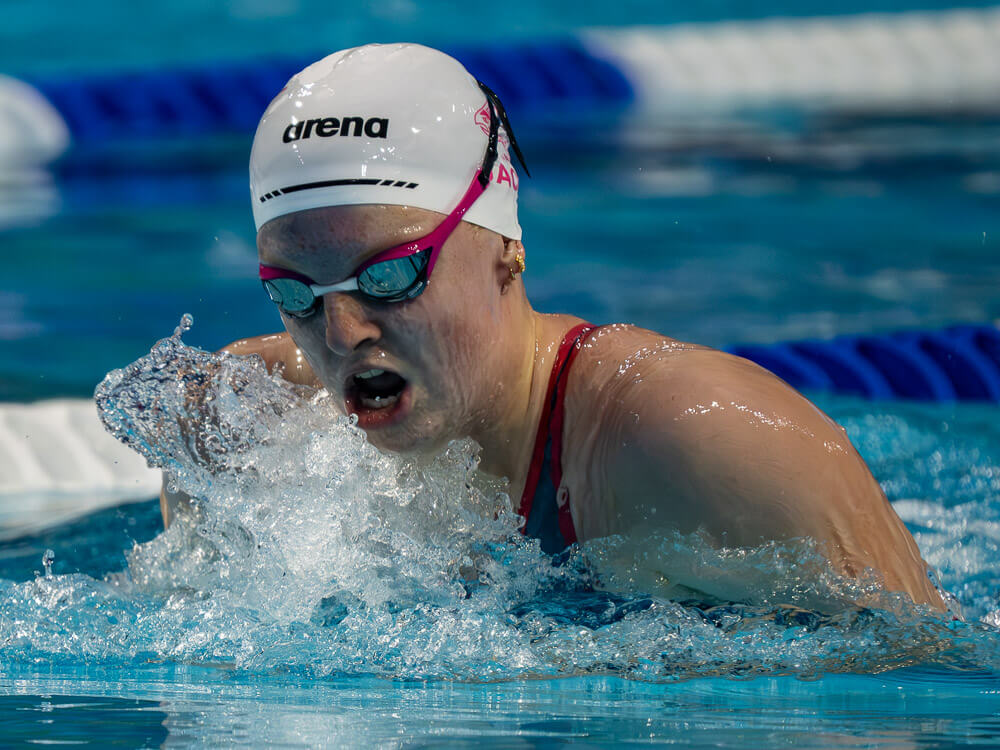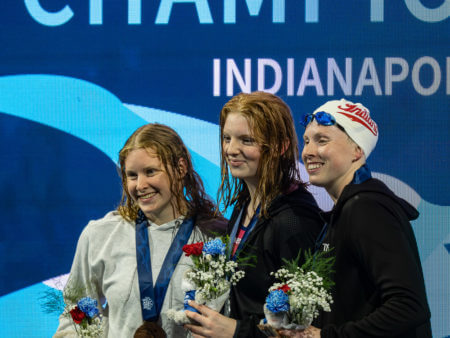Lydia Jacoby Details Battle With Post-Olympic Depression: ‘I Didn’t Give Myself Time To Breathe’

Lydia Jacoby Details Battle With Post-Olympic Depression: ‘I Didn’t Give Myself Time To Breathe’
Only months after experiencing grandeur unlike anything she had imagined, Lydia Jacoby came close to rock bottom. She was an Olympic gold medalist, the surprise winner of the women’s 100 breaststroke in Tokyo after a stunning four-month rise from obscurity, but back at home in Seward, Ala., in the midst of her senior year of high school, Jacoby had days where she laid in bed for hours on end scrolling through her phone.
Swimming remained a constant in her life, but her ethos on the sport had shifted. As an Olympic champion, she figured, the same old would not suffice, and it went to her head.
“I would go to practice every day like I normally do, but I wouldn’t be there. I wouldn’t be thinking about it. I would just be going through the motions, and that’s not good enough if I wanted to swim at this level. It was impacting a lot of areas of my life. After the Olympics, I started thinking about the Olympics more of a career than a passion, and I think that’s what started bringing me downhill,” Jacoby said.
“I just won an Olympic medal, so of course I was like, ‘I know everything about everything.’ So I wanted to do everything by myself, but that’s just not how the world works.”
Following Tokyo, Jacoby had hurried back to training, with the immediate high of her gold sustaining her. ” I took about a week off, which is nothing,” she said. “I think that was a big part of why I burnt out so heavily. I was so excited after the Olympics — I was like, ‘I’ve got to do this right now’ — that I didn’t give myself any time to breathe.”
As the season progressed, the symptoms began to show. Jacoby was part of the U.S. team at the Short Course World Championships in Abu Dhabi, but she departed the meet before competing in her main event, the 100 breast, because of COVID-19 concerns. At that point, she said, “I realized it was affecting other areas of my life.” But until April, when she arrived at the U.S. International Team Trials in Greensboro, N.C., where the 2022 World Championships team would be selected, the playbook remained the same: “Deny, deny, deny.”
Until she missed the World Championships team. With four women in contention for two Worlds spots in the 100 breast, Lilly King pulled ahead of the field to take the win while Annie Lazor emerged from a tight bunch to take second place, with only nine hundredths separating Lazor, Kaitlyn Dobler and Jacoby.
It was only after Greensboro that Jacoby recognized the symptoms of depression and took steps to focus on her mental health. Big life changes were coming regardless, with Jacoby heading to the University of Texas to begin her college career, but before that, Jacoby chose to take the entire summer off of swimming. She traveled to Europe to race on the Mare Nostrum tour but then had two full months away from regular training before heading to Austin.
Joining coach Carol Capitani’s women’s squad at Texas, Jacoby found her place with her teammates, and her training was reinvigorated. She had been the big fish in a small pond in Alaska, but now she was practicing daily with the likes of Anna Elendt, who had just won silver in the 100 breast at the World Championships for Germany.
“My team in Alaska is amazing. My coach is amazing. Awesome team, but really not a lot of people on my level,” Jacoby said. “Just being able to count on everybody at practice every day, showing up every time ready to work, ready to get to the same place as I am, is a really awesome environment.”

Kaitlyn Dobler, Lydia Jacoby & Lilly King after the 100 breaststroke final at U.S. Nationals — Photo Courtesy: Peter H. Bick
The results quickly showed: a win in the 100-yard breast at the NCAA Championships followed by 1:05s in-season in the long course equivalent event, setting herself up for an international return at U.S. Nationals. And indeed, Jacoby came through. After a second-place finish in the 50 breast, Jacoby took second in the 100 breast, with Lilly King requiring the fourth-best effort of her lengthy career (1:04.75) to hold off Jacoby’s 1:05.16. Jacoby’s time was just two tenths off her gold-medal-winning time from Tokyo.
“I’m really happy with how it went,” Jacoby said. “I was putting a lot of pressure on myself. I missed the team last year. I never wanted to feel that way again, so I was definitely stressing a little. I was trying not to show it. I thought I was playing it cool, but after the race, they were like, ‘Yeah, we could tell you were stressed.’ I’m excited to go to Worlds, and the pressure will be off a little bit. It’s nothing like U.S. Trials.”
Her time was the third-fastest in the world behind only King and Russia’s Evgeniia Chikunova, who will be barred from Worlds along with all Russian swimmers, and Jacoby was far ahead of the speed required to take gold at last year’s championship meet. The Americans are now slightly favored for a 1-2 finish in Fukuoka, although South Africans Tatjana Schoenmaker and Lara van Niekerk, the Netherlands’ Tes Schouten, Italy’s Benedetta Pilato and others will be in contention as well.
But even as she has returned to the results reflective of her gold-medal status, Jacoby is committed to remaining cognizant of mental health. She is careful to notice any signs of depression symptoms to “be proactive and see my therapist before it gets to a point where I’m not able to do the things that I need to be doing.”
And beyond her own swimming career, Jacoby knows it’s important to speak out about her story to eliminate the stigma surrounding mental health in sport. Big-name Olympians have shared their stories and even withdrawn from major competitions, including the well-publicized story of gymnast Simone Biles at the Tokyo Olympics and Caeleb Dressel at last year’s World Championships. Jacoby and others in swimming have been heartened to see the narrative shift.
“Coming into the Olympics, I didn’t know what depression was, essentially. It’s something that I had heard people talk about, but it was something on another planet. It had nothing to do with me. During the whole Olympic cycle, Simone Biles dropped out of the Olympics, and there were a lot of discussions going on about mental health, and a lot of people were talking about post-Olympic depression and all that. Even then, I was like, ‘I have a medal. I have two medals. That doesn’t apply to me,’” Jacoby said.
“Just to realize that it can apply to everyone and just being proactive about it, it really helps to hear people talking about it so you can realize the signs in yourself before it gets out of hand.”




